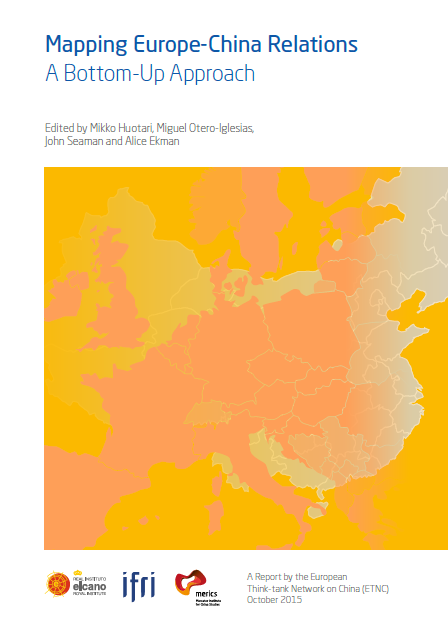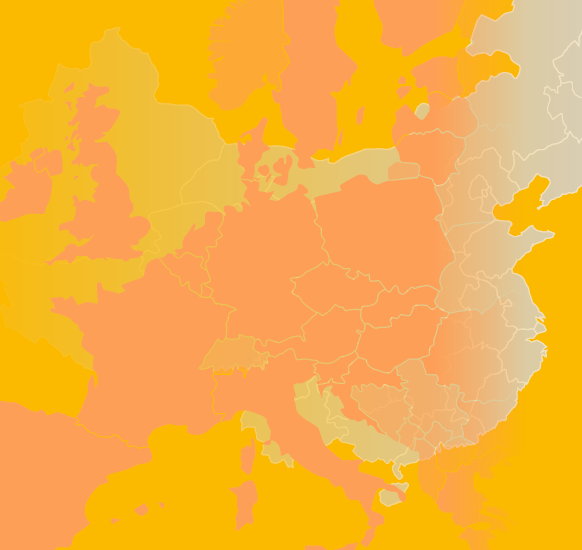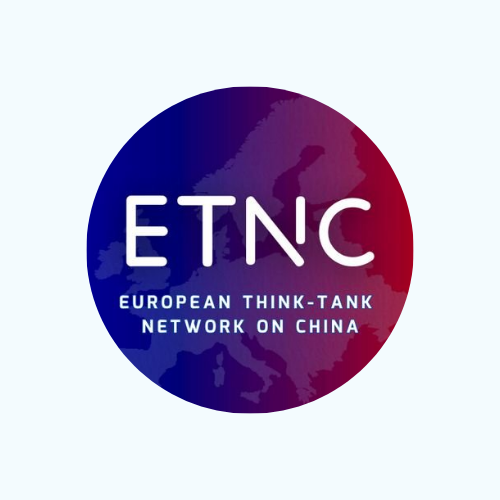Mapping Europe-China Relations: A Bottom-Up Approach. A Report of the European Think-tank Network on China ETNC, October 2015

As China’s rise continues to shape and shake the course of international affairs, and Europe enters a new chapter in its collective history, Europe-China relations are becoming more relevant, but also much more complex.

Understanding these complexities requires a precise examination of the various state-level bilateral relationships and interests at play between China and the EU countries. From such a bottom-up perspective, this report makes a number of observations:
For all EU member states, interdependence in economic relations with China has increased and political relations have gained in maturity and depth. High-level exchanges between European capitals and Beijing are much more frequent.
The context of EU-China relations has dramatically changed over the past five years. China’s interest in Europe is expanding into new areas, both geographically (Central, Eastern and Southern Europe) and in substance (for instance with increasing Chinese investment in Europe). Europe is encountering a much more proactive China on the diplomatic front and the contours of the relationship are increasingly designed in Beijing. Asymmetries in EU member states’ relations have turned increasingly to Beijing’s favour. European governments find their relative influence over Beijing waning. This is exacerbated by their lack of communication, cohesion and, consequently, their inability to formulate common policies.
Indeed, in dealing with China, Europe is divided and competes with itself. This competition, or at the very least lack of coordination on China policies, stems more from deficiencies within Europe than from a deliberate Chinese strategy to divide the continent. With growing competition for Chinese investments, for instance, China is presented with 28 ‘gateways to Europe’. In return, China has been keen to re-package this argument and highlight the special nature of its relationship with individual European partners.
While some common patterns exist, new trends in investment and trade relations with China are highly differentiated across Europe. This fundamentally complicates a joint European response vis-à-vis China with regard to pressing issues such as granting China Market Economy status and with regard to ongoing or upcoming negotiations of trade and investment agreements.
China is following its own distinct and flexible foreign policy approach when dealing with Europe. It constantly assesses new developments in European markets, adjusts to changes in the domestic and regional context as much as possible and looks to seize opportunities whenever they emerge. Europe is important for China as an economic partner, but the Europeans – the EU and its individual member states – are also key players in China’s broader global strategic initiatives, such as the ‘One Belt, One Road’ (OBOR) project, the reconfiguration of multilateral and international institutions (as witnessed with the creation of the Asian Infrastructure and Investment Bank – AIIB), and the emergence of a more multipolar global order.
Despite some modest efforts to develop genuine strategic dialogues, most, if not all European national strategies towards China are dominated by the logic of economics. The state of the European economy has caused many to look to China in recent years as a potential source of growth, or a diversification of economic interests that are intricately tied to the rest of Europe and, for many countries in Central and Eastern Europe (CEE) in particular, uncomfortably tied to Russia. In this context, many European states are continuing to make hard choices between political ideals, such as the promotion of democracy and human rights in China, and their economic strategy. While for many these political ideals remain in place, their prominence in the bilateral relations with Beijing has weakened, and actions taken by individual states on this front have rarely been met with support from other EU partners.
This is a preliminary report following the inaugural meetings of the European Think-tank Network on China (ETNC), a network co-founded by Ifri and the Elcano Royal Institute in November 2014, and coordinated in conjuction with the Mercator Institute for China Studies (MERICS) and 12 other policy research institutes across Europe. While the report is a first step toward understanding the dynamics and multilayered complexity of EU-China relations, it is still premature for ETNC – as a new expert network – to provide policy recommendations on how to better coordinate the EU’s foreign policy towards China. Following a bottom-up approach, the authors strongly believe that more cohesive European policies can only be designed once the individual bilateral relations are properly understood. This first report therefore provides an initial, detailed mapping of some of these relations. Ideally, this exercise will be repeated on a regular basis and expanded to comparative analyses of specific developments and concrete policy items in EU-China relations.
Chapters of the report
1. Introduction: Dissecting and re-assembling Europe-China relations
Miguel Otero-Iglesias, John Seaman, Mikko Huotari and Alice Ekman
2. Czech-China relations: Accelerated ice melting
Rudolf Fürst
3. Finland-China relations: Pragmatic cooperation since 1950
Jyrki Kallio
4. France and China: A not so ‘special’ relationship
Alice Ekman and John Seaman
5. Germany’s China policy: No honeymoon forever
Mikko Huotari
6. Greece and China: Discovering each other at last?
Plamen Tonchev
7. Hungary and China: Hopes and reality
Tamás Matura
8. Italy and China: Investing in each other
Nicola Casarini and Marco Sanfilippo
9. Netherlands-China relations: Aiming for openness and pragmatism
Frans-Paul van der Putten
10. Poland-China relations: Forging a strategic partnership?
Justyna Szczudlik-Tatar
11. Portugal-China relations: A ‘great leap forward’ in the new millennium
Zélia Breda
12. Romania and China: Rekindling the special relationship?
Simona R. Soare
13. Spain-China relations: Friends but not partners
Mario Esteban
14. Sweden-China relations: Increased maturity in cooperation and competition
Johan Lagerkvist, Aras Lindh and Mattias Hult
15. UK-China relations: Navigating a changing world
Tim Summers
Download the full analysis
This page contains only a summary of our work. If you would like to have access to all the information from our research on the subject, you can download the full version in PDF format.
Mapping Europe-China Relations: A Bottom-Up Approach. A Report of the European Think-tank Network on China ETNC, October 2015
Related centers and programs
Discover our other research centers and programsFind out more
Discover all our analyses
Opening up the G7 to South Korea to Address Contemporary Global Challenges
The G7’s global influence has diminished as powers like China reshape international governance through initiatives such as BRICS and the Shanghai Cooperation Organisation (SCO). With the G7 now representing just 10 per cent of the world’s population and 28 per cent of global GDP, its relevance is increasingly questioned.
Expanding SPDMM as a pivotal institution in the Pacific – A French perspective
The South Pacific Defence Ministers’ Meeting (SPDMM) is the only forum that brings together defense ministers from the wider South Pacific — including Chile, which is hosting it for the first time. This heterogeneous group of countries with varying resources, capacities, and interests — Australia, Chile, Fiji, France, New Zealand, Papua New Guinea (PNG), and Tonga — are united by their shared determination to strengthen cooperation on maritime security and humanitarian assistance and disaster relief (HADR) activities.
EU’s Derisking From China: A Daunting Task
With economic security as a major concern, the EU has recently turned to “derisking” from China. The EU strategy entails reducing critical dependencies and vulnerabilities, including in EU supply chains, and diversifying where necessary, while recognizing the importance and need to maintain open channels of communication.
Sri Lanka’s NPP Government. From System Change to Structural Compliance
In September 2024, a relative outsider to Sri Lanka’s two-party-dominated political system, Anura Kumara Dissanayake, won the presidential elections. The anti-establishment, populist movement he represented, the National People’s Power (NPP), went on to receive an overwhelming mandate in the November 2024 general elections, winning 159 seats in a 225-member parliament.














